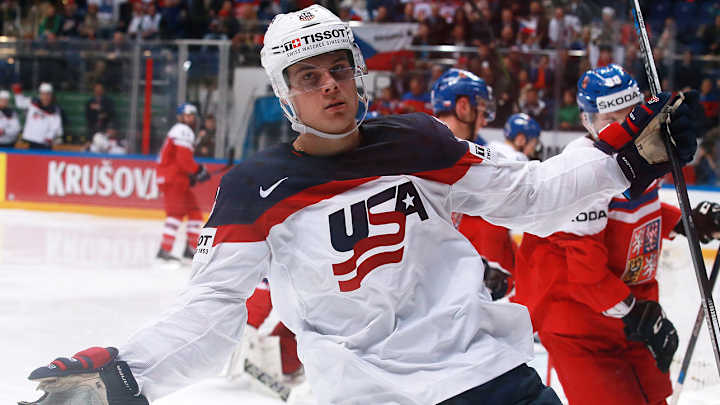The American Dream: Imagining Olympic Hockey With NHL Players

He became an American icon with a single snap of the wrist, but Auston Matthews will need lots more practice if he ever wants to make American Idol. As the star-spangled banner rose toward the rafters at Gangneung Hockey Centre following the U.S.’s stunning 4–3 gold medal victory over Canada, NBC mics caught the 20-year-old center belting out the national anthem. “I was standing next to him,” said teammate James Van Riemsdyk. “It was brutal. More like Francis Scott Off-key, am I right?”
It wasn’t simply that Team USA stayed sharp and the Canadians went flat. The Americans’ improbable path in PyeongChang was marked throughout by bright stars (Johnny Gaudreau scored a team-high five goals on Matthews’s left wing; Cory Schneider sparkled with a .969 save percentage) who shined from dawn’s early light (preliminary victories over Slovakia and the Russian began around 7 a.m. EST) to twilight’s last gleaming. As 2 a.m. neared in Toronto—where a frosty reception no doubt awaits him upon his return to the Maple Leafs—Matthews barreled across the opposing blue line, less than a minute into overtime. O, say, can you see . . . the beauty in Doc Emrick’s call?
Matthews in all alone . . . forehand . . . backhand . . . He SCORES!
Like Al Michaels asking about our faith in the supernatural, those words will ring for generations. In 1980, a group of college students about Matthews’s current age pulled off the Miracle on Ice before bringing home Team USA’s last gold in men’s hockey. Over the nine Olympics since, the U.S. has earned just two silvers, the most recently coming eight years ago in Vancouver after by Canada captain Sidney Crosby’s sudden-death winner. But a new era is cresting, marked by speed, creativity and, most important, youth: Nine U.S. skaters had played for the supersonic under-23 Team North America at the 2016 World Cup.
No, the skill gap at PyeongChang wasn’t nearly as cavernous as when Herbs Brooks’s boys toppled the Soviets at Lake Placid, but this was still Team Canada. (John Tavares as the third-line center? Blueliners P.K. Subban and Shea Weber on the bottom pair? Ridiculous.) As such, an hour after tying the final at 3–3 on a late power play goal, U.S. winger Phil Kessel was still shaking his head and telling coach Mike Sullivan through sips of champagne, “I still can’t believe it. We beat the Canadians.”
Down the hall, the mood was dour. No doubt that Canada would be favored in a seven-game series for worldwide supremacy—any interest in further delaying the regular season, Commissioner Bettman?—though that notion offered no consolation. There were the two crossbars pinged by Crosby in the second period; the 45 saves by Schneider; the blocked shot on defenseman Drew Doughty that sprung Matthews free as the clock ticked down . . . all fuel for future nightmares.
Luckily, the tournament hosts were much sunnier. South Korea never stood a chance in its three group stage games, but fans packed the rink blowing bullhorns and beating drums; their faith was briefly rewarded upon taking a brief 1–0 lead over Canada, when a puck briefly got lost in Brent Burns’s beard and reappeared behind goalie Carey Price before ultimately falling 14–1. Fewer than 3,000 hockey players are registered in Korea, but nation and Oympic sport proved a perfect match. When Jaromir Jagr returned from his self-imposed international hiatus and cameoed with the sixth-place Czech Republic, stores in the MyeongDong shopping district sold out of mullet wigs. And instead of guzzling his usual midgame Coca-Cola on the bench, winger Alex Ovechkin slogged down Pocari Sweat, the popular sports drink that tastes like it sounds.
The Great 8 was his usual self, bashing four goals in five games for the Olympic Athletes from Russia, so named as part of the punishment for the country’s state-run doping program. After a 4–1 semifinal loss to Canada, the O.A.R. had its hopes shattered by Sweden in the bronze-medal game 6–4, undone by a comparatively thin defensive corps that proved no match for Erik Karlsson (three assists) and Tre Kronor. Television numbers were equally as erratic, a predictable result given the time difference, but the late-night, all-North America final became a ratings bonanza for NBC and another instant Olympic classic for hockey history.
And to think: This would have been a fantasy had it not been for secret 11th hour negotiations between the IOC and NHL, brokered by the NHL Players’ Association. (Asked about reports from a German newspaper that IOC president Thomas Bach’s change of heart was inspired by visions on Christmas Eve, a spokesperson declined to comment.) The peace should extend four more years to the next Winter Games, in Beijing, which NHL officials are frothing to attend.
A tasty rematch looms in 2022, between a Canadian core in its 30s and a U.S. program entering its golden age, but the future was hardly on the victors’ minds. As Matthews said on the ice in Gangneung, stealing kisses of his precious medal, “This almost feels too good to be true.”
